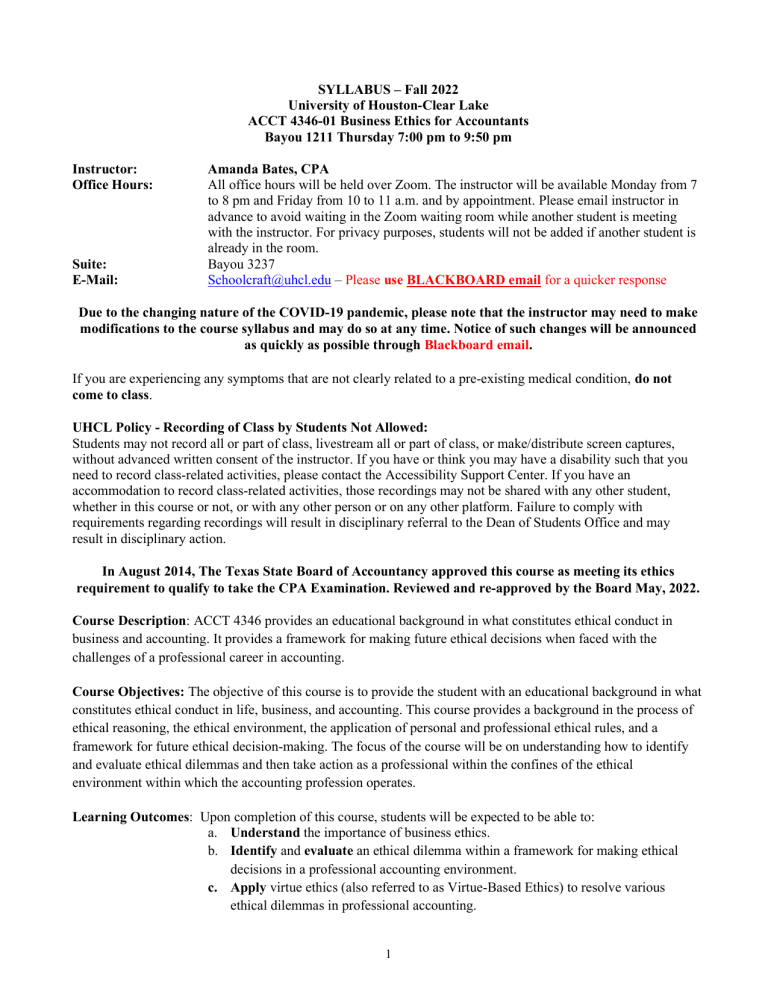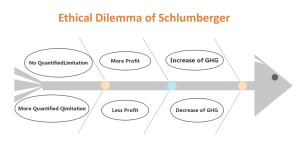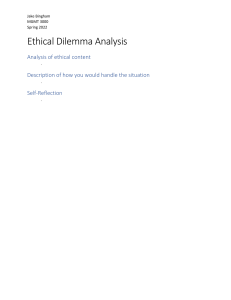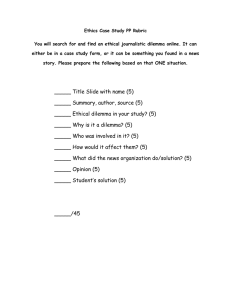
SYLLABUS – Fall 2022 University of Houston-Clear Lake ACCT 4346-01 Business Ethics for Accountants Bayou 1211 Thursday 7:00 pm to 9:50 pm Instructor: Office Hours: Suite: E-Mail: Amanda Bates, CPA All office hours will be held over Zoom. The instructor will be available Monday from 7 to 8 pm and Friday from 10 to 11 a.m. and by appointment. Please email instructor in advance to avoid waiting in the Zoom waiting room while another student is meeting with the instructor. For privacy purposes, students will not be added if another student is already in the room. Bayou 3237 Schoolcraft@uhcl.edu – Please use BLACKBOARD email for a quicker response Due to the changing nature of the COVID-19 pandemic, please note that the instructor may need to make modifications to the course syllabus and may do so at any time. Notice of such changes will be announced as quickly as possible through Blackboard email. If you are experiencing any symptoms that are not clearly related to a pre-existing medical condition, do not come to class. UHCL Policy - Recording of Class by Students Not Allowed: Students may not record all or part of class, livestream all or part of class, or make/distribute screen captures, without advanced written consent of the instructor. If you have or think you may have a disability such that you need to record class-related activities, please contact the Accessibility Support Center. If you have an accommodation to record class-related activities, those recordings may not be shared with any other student, whether in this course or not, or with any other person or on any other platform. Failure to comply with requirements regarding recordings will result in disciplinary referral to the Dean of Students Office and may result in disciplinary action. In August 2014, The Texas State Board of Accountancy approved this course as meeting its ethics requirement to qualify to take the CPA Examination. Reviewed and re-approved by the Board May, 2022. Course Description: ACCT 4346 provides an educational background in what constitutes ethical conduct in business and accounting. It provides a framework for making future ethical decisions when faced with the challenges of a professional career in accounting. Course Objectives: The objective of this course is to provide the student with an educational background in what constitutes ethical conduct in life, business, and accounting. This course provides a background in the process of ethical reasoning, the ethical environment, the application of personal and professional ethical rules, and a framework for future ethical decision-making. The focus of the course will be on understanding how to identify and evaluate ethical dilemmas and then take action as a professional within the confines of the ethical environment within which the accounting profession operates. Learning Outcomes: Upon completion of this course, students will be expected to be able to: a. Understand the importance of business ethics. b. Identify and evaluate an ethical dilemma within a framework for making ethical decisions in a professional accounting environment. c. Apply virtue ethics (also referred to as Virtue-Based Ethics) to resolve various ethical dilemmas in professional accounting. 1 d. Describe and understand the ethical environment within which professional accountants work. e. Apply the Code of Professional Conduct of the American Institute of Certified Public Accountants (AICPA) to ethical dilemmas that occur in public and private accounting. f. Understand the code of ethics (conduct) of the Texas State Board of Public Accountancy, the Security Exchange Commission (SEC), and the International Federation of Accountants (IFAC). Course Prerequisite: Intermediate Accounting I & II (ACCT 3431/3341 & ACCT 3432/3342) or Financial Accounting I & II (ACCT 5133 & ACCT 5134) or equivalents. Required Text/Video: Business Ethics Ethical Decision Making and Cases by O.C. Ferrell, John Fraedrich, and Linda Ferrell, 12th Edition, ISBN-10: 1337614432. An electronic version of this textbook may be rented from sources such as Amazon.com. Inside Job (2010) DVD is available through sources such as Amazon.com. The Smartest Guys in the Room: The Amazing Rise and Scandalous Fall of Enron by Bethany McLean and Peter Elkind (DVD or book). Course Format: This course is presented in a web enhanced format. Class sessions will be conducted in a seminar format. Students are expected to have completed the assigned reading and case studies and be prepared to actively participate in the discussions. In addition, students are expected to post on Blackboard weekly. PowerPoint & Videos: Video lectures on the PowerPoint slides and other materials are provided for each chapter covered. Other supplemental videos are also provided. Students are expected to watch all videos as part of the course. Attendance Policy: Attendance is not graded for this course. Success in this course is dependent on your active participation and engagement throughout the course. As such, students are required to complete all assignments by the due date, and to actively participate in class discussions. Additionally, students are expected to log on at least three times a week – on different days in order to complete weekly assignments, assessments, discussions and/or other weekly deliverables as outlined in the syllabus. If you do not attend the f2f class meeting you are expected to watch the weekly lecture that is available on blackboard as well as any posted additional materials. If you are feeling ill or have a respiratory illness of any kind, with fever and cough, you should stay home to prevent spreading it to others. You should not come to class if you know, or have reason to suspect, you have been in close contact with a person infected with COVID-19. Electronic Devices: Cell phones, laptops, and other communication devices MUST be turned off during class and kept off the desk top. Check Blackboard email. You are responsible to check your email daily. 2 Semester Grades will be assigned as follows: There are no predetermined number of “A”s, “B”s, “C”s, etc. for the course. Grades are based on total points and assigned on a curve determined by the instructor. The plus/minus system will be used in assigning grades. The curve will be no higher than the following: total points of 558 – 600 = A, 540 – 557 = A-, 522 – 539 = B+, 498 – 521 = B, 480 – 497 = B-, 462 – 479 = C+, 438 – 461 = C. Grading Procedure: Your grade for the course will be determined by the total number of points earned. Points are allocated as follows: Total Points Weekly Participation in Ethical Dilemma Case Discussion Board 260* No make-ups will be allowed Quizzes – AICPA, Texas Ethics, Other 100 Midterm Exam 120** Exam will be closed book. Final Exam 120 TOTAL 600 ** See make-up exam policy. Exams will be online and monitored. You will need access to a computer with internet access and a camera. Respondus: Information about Respondus can be found on the UHCL home page. From UHCL.edu select: “Contact Us” - upper right-hand corner of the page “Browse All Departments” - center of the page. “Office of Information Technology - ¾ of the way down the list on the right-hand side Within the drop dop list under “Course Development” - options in blue on the left side of the screen “Online Proctoring Resources” - select this option. “Student Information” - center of the page. There you will find helpful links to get started using Respondus. Make-up Exams: THERE ARE NO MAKE-UP EXAMS GIVEN FOR MIDTERM EXAM WITHOUT THE PRIOR APPROVAL OF THE INSTRUCTOR. Weekly Participation in Ethical Cases Discussion Board: Students will be assigned cases as noted in the Schedule posted and the last page of the syllabus. Students will be expected to post insightful comments on the cases as outlined in the separate directions provided in the Content folder. Participation in the weekly discussion board will provide additional insights and help you see how other’s views of the cases differ from yours. It will also pace the course so you do not fall behind. Students are encouraged to discuss cases and the chapter material outside of class but all posts must be made individually and will be graded individually. All posts must abide by the Professional Discussion Pledge. Student introductions are posted in the ‘Course Introductions’ forum so you can get to know your fellow students before you start the other discussions. Time Expectation: The time students spend on this course is expected to vary based on your prior familiarity with the material. The instructor estimates that you should spend at least six hours but not need to spend more than nine hours on average per week on this class. 3 Communication and Policy on Late Assignments: If you fall behind the expected pace of the course, it is your responsibility to contact the instructor. No late posting on the discussion board will be accepted. Anything not completed by the end of the week after the due date will be assigned a score of zero. All assignments will be graded within one week of submission and feedback, if necessary, provided through Blackboard. Blackboard E-mail Facility: With the course e-mail facility, you may contact the instructor or any other student. The course e-mail facility is intended for communications person to person about the content of this course. Contacting the Instructor: I will check this course’s Blackboard email at least once a day Monday through Friday, excluding university holidays. Please plan ahead since I will not be checking Blackboard during the weekend. Discussions: The “Discussions” bulletin board is the primary facility for students to ask for assistance from the instructor/students and give assistance to other students. Collaboration is encouraged on all homework assignments, but you must do your own write-ups in your own words. Please post questions on or answers to questions pertaining to the course materials. Please post them in the ‘Main’ forum. However, use the email facility to ask the instructor direct questions. Student introductions are posted in the ‘Course Introductions’ forum. With the exception of the case study postings, you are allowed to post your questions and answers anonymously. However, anonymity will be rescinded if things get ‘out of hand’ due to harsh criticisms, name calling, and so on. You are allowed to upload a file on the bulletin board as long as it is relevant to the course and as long as uploading the file is legal. Learning and Troubleshooting: To learn more about Blackboard, you can visit the Blackboard 9.1 On Demand Learning Center at http://ondemand.blackboard.com/. It has short, interactive video tutorials and guides to help you get started. If you have difficulty accessing Blackboard (including login issues), please contact UHCL’s Support Center at either 281-283-2828 or http://courses.uhcl.edu/SSS/help.shtml. Their hours are Monday through Thursday 8 A.M. to 10 P.M. (central time) and Friday and Saturday 8 A.M. to 5 P.M. Occasionally, there are problems with the Blackboard server and you will not have access to the course. The server is usually back up within 24 hours. Incomplete Grades: For emergency situations that occur after the “Drop” date, a grade of incomplete (“I”) may be given to students who are making satisfactory progress. Failing grades do not constitute an emergency. Last Day To Drop: Withdrawals from the course must be filed in the Office of Enrollment Services. The last day to drop/withdraw from this course without grade penalty is provided in the Academic Calendar. Students who stop participating in the class without officially dropping the course will receive a failing grade in the course. 6 Drop Rule: Students who entered college for the first time in Fall 2007 or later should be aware of the course drop limitation imposed by the Texas Legislature. Dropping this or any other course between the first day of class and the census date for the semester/session does not affect your 6 drop rule count. Dropping a course between the census date and the last day to drop a class for the semester/session will count as one of your 6 permitted drops. You should take this into consideration before dropping this or any other course. Visit www.uhcl.edu/records for more information on the 6 drop rule and the census date information for the semester/session. 4 Statement on Assessment: The School of Business may use assessment tools in this course and other courses for curriculum evaluation. Educational Assessment is defined as the systematic collection, interpretation, and use of information about student characteristics, educational environments, learning outcomes, and client satisfaction to improve program effectiveness, student performance, and professional success. This assessment will be related to the learning objectives for each course and individual student performance will be disaggregated relative to these objectives. This disaggregated analysis will not impact student grades, but will provide faculty with detailed information that will be used to improve courses, curriculum, and students’ performance. Academic Honesty: The Academic Honesty Policy at UHCL (found on the Dean of Students’ website, the Faculty Handbook, the Student Handbook, the Senior Vice President and Provost’s website, the Graduate Catalog, and the Undergraduate Catalog) states: Academic honesty is the cornerstone of the academic integrity of the university. It is the foundation upon which the student builds personal integrity and establishes a standard of personal behavior. Because honesty and integrity are such important factors in the professional community, you should be aware that failure to perform within the bounds of these ethical standards is sufficient grounds to receive a grade of "F" in this course and be recommended for suspension from UHCL. The Honesty Code of UHCL states "I will be honest in all my academic activities and will not tolerate dishonesty." Special Academic Accommodations: The University of Houston System complies with Section 504 of the Rehabilitation Act of 1973 and the Americans with Disabilities Act of 1990 pertaining to the provision of reasonable academic adjustments/auxiliary aids for students who have a disability. In accordance with Section 504 and ADA guidelines, the University of Houston‐Clear Lake strives to provide reasonable academic adjustments/auxiliary aids to students who request and require them. If you believe that you have a disability requiring an academic adjustments/auxiliary aid, please contact Disability Services at 281‐283‐2648, disability@uhcl.edu, and www.uhcl.edu/disability. Inclement Weather: Occasionally, weather conditions force the closing of the university. This information becomes available on the UHCL Emergency Hotline (281-283-2221) as soon as the decision to close is made. Career and Counseling Services: UHCL offers counseling and testing services for students. If you have trouble studying or taking exams; need to figure out if you have chosen the right career path, need a job-or whatever might be bothering you-this office can help you find an answer. To learn more about the valuable services offered, visit: career services at http://prtl.uhcl.edu/portal/page/portal/CSS and counseling services at http://prtl.uhcl.edu/portal/page/portal/COS for more information. HOW TO STUDY FOR THIS COURSE: Read the textbook chapter before you listen to the video lecture. Think about the ethical dilemma presented at the beginning of the chapter while you are reading the rest of the chapter. Keep in mind that these dilemmas do not have a clear right answer. Read your cases for the week. Spend some time thinking about the dilemma and case assigned. Evaluate them using the framework concepts from the textbook as well as from sources like KPMG. Draft your comments then review them before posting them in the discussion board. Professionals do not write and then immediately send complex material, professional opinions, or sensitive information. A second look may provide critical insights into what you have written. 5 ACCOUNTING 4346-01 ASSIGNMENT SCHEDULE FALL 2022 (Schedule is subject to update and change.) Week Course Discussion Cases/Quizes 1 Week Beginning 8/22 Chapter 1 – The Importance of Business Ethics 2 8/29 Chapter 2 – Stakeholder Relationships, Social Responsibility, and Corporate Governance 3 9/5 Chapter 3 – Emerging Business Ethical Issues 4 9/12 5 9/19 Video - Inside Job *Watch on your own – No Class Meeting Chapter 4 – The Institutionalization of Business Ethics Introduce yourself to the class by posting to the “Course Introductions” Discussion Board. (Name, Major, Graduation Date, something interesting about you, etc.) Chapter Quiz 1 Ch. 2 Ethical Dilemma and Case 1 Discussion Boards Chapter Quiz 2 Ch. 3 Ethical Dilemma and Case 3 Discussion Boards Chapter Quiz 3 Inside Job Discussion Board 6 9/26 Chapter 5 – Ethical Decision Making Code Quiz 1 – available 9/26 thru 9/30 7 10/3 Chapter 6 – Individual Factors: Moral Philosophies and Values 8 10/10 9 10/17 Midterm (chapter 1-6) Exam will be online and monitored. Chapter 7 – Organizational Factors: The Role of Ethical Culture and Relationships 10 10/24 Chapter 8 – Developing an Effective Ethics Program 11 10/31 Chapter 9 – Managing and Controlling Ethics Programs 12 11/7 13 11/14 Video/Book - The Smartest Guys in the Room *Watch on your own – No Class Meeting Chapter 10 – Globalization of Ethical DecisionMaking 14 11/21 15 11/28 16 12/5 Chapter 11 – Ethical Leadership Code Quiz 2 – available 11/21 thru 11/25 **No In-Person Class** Chapter 12 – Sustainability: Ethical and Social Responsibility Dimensions Final Exam – Comprehensive Exam will be online and monitored. 6 Ch. 4 Ethical Dilemma and Case 6 Discussion Boards Chapter Quiz 4 Ch. 5 Ethical Dilemma and Case 7 Discussion Boards Chapter Quiz 5 Ch. 6 Ethical Dilemma and Case 11 Discussion Boards Chapter Quiz 6 October 13th Ch. 7 Ethical Dilemma and Case 13 Discussion Boards Chapter Quiz 7 Ch. 8 Ethical Dilemma and Case 15 Discussion Boards Chapter Quiz 8 Ch. 9 Ethical Dilemma and Case 17 Discussion Boards Chapter Quiz 9 The Smartest Guys in the Room Case Discussion and Read Case 20 Ch. 10 Ethical Dilemma and Case 18 Discussion Boards Chapter Quiz 10 Ch. 11 Ethical Dilemma and Case 19 Discussion Boards Chapter Quiz 11 Chapter Quiz 12 December 8th




